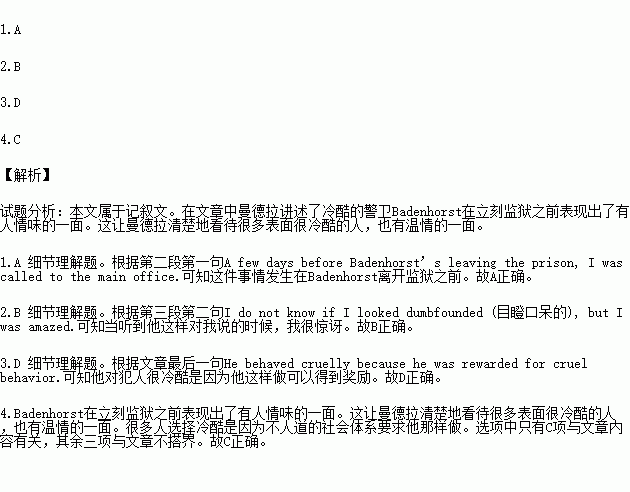题目内容
During Nelson Mandela’s 19 years in the prison on Robben Island, one particular commanding officer, Badenhorst, was the cruelest of them all:
“A few days before Badenhorst’s leaving the prison, I was called to the main office. General Steyn was visiting the island and wanted to know if we had any complaints. Badenhorst was there as I went through a list of demands. When I had finished, Badenhorst spoke to me directly.
He told me he would be leaving the island and added: ‘I just want to wish you people good luck’. I do not know if I looked dumbfounded (目瞪口呆的), but I was amazed. He spoke these words like a human being and showed a side of himself we had never seen before. I thanked him for his good wishes and wished him good luck too.
I thought about this moment for a long time afterwards. Badenhorst had perhaps been the most cold–blooded and cruelest commanding officer we had had on Robben Island. But that day in the office, he had showed that there was another side to his nature, a side that had been hidden but still existed.
It was obvious that all men, even the most seemingly cold-blooded, have a heart of kindness and that, if their hearts are touched, they are able to change. Actually, Badenhorst was not evil; his inhumanity (不人道) had been encouraged by an inhuman system. He behaved cruelly because he was rewarded for cruel behavior.”
1.When did the story happen?
A. Before Badenhorst left the prison.
B. Before Mandela gave demands.
C. After General Steyn took over the prison.
D. Just when Mandela was set free.
2.How did Mandela feel at what Badenhorst said?
A. Awkward. B. Surprised. C. Angry. D. Upset.
3.Why did Badenhorst become the cruelest according to Mandela?
A. He was born evil.
B. He seemed cold-blooded.
C. He was easily changed.
D. His cruelty was rewarded.
4. Which could be the best title of the passage?
A. Hide oneself or express oneself?
B. Hard to change or easy to change?
C. Cruel by name or cruel by nature?
D. To be a prisoner or to be a commander?

